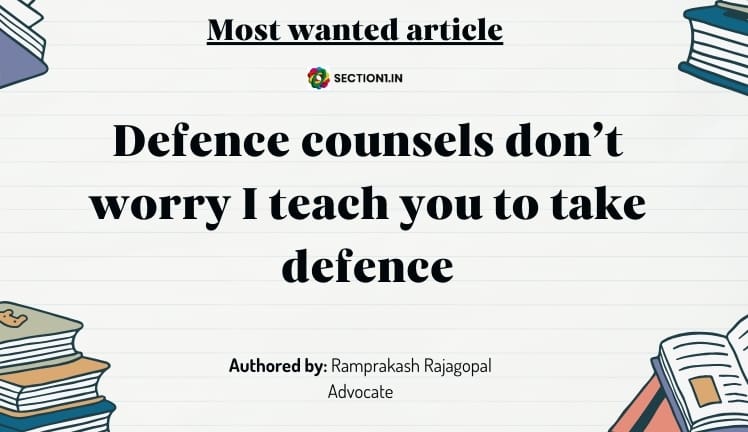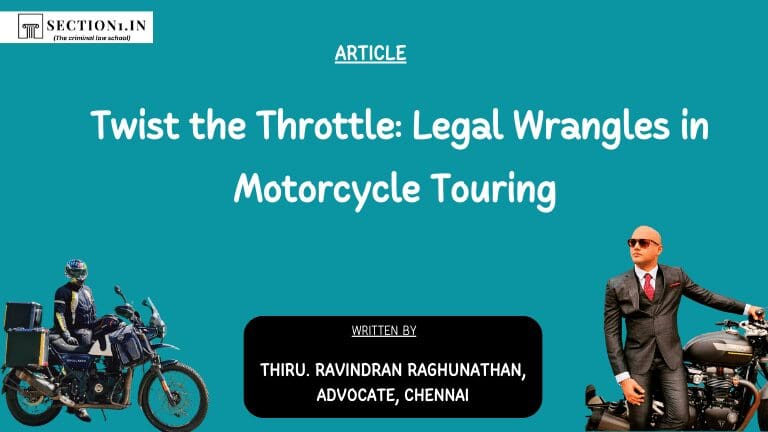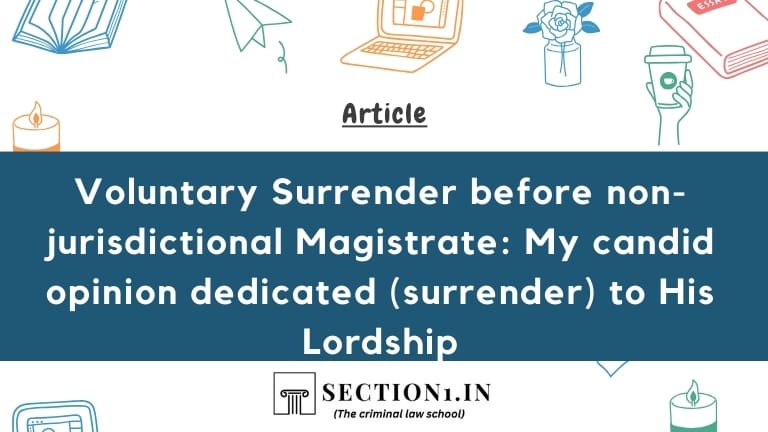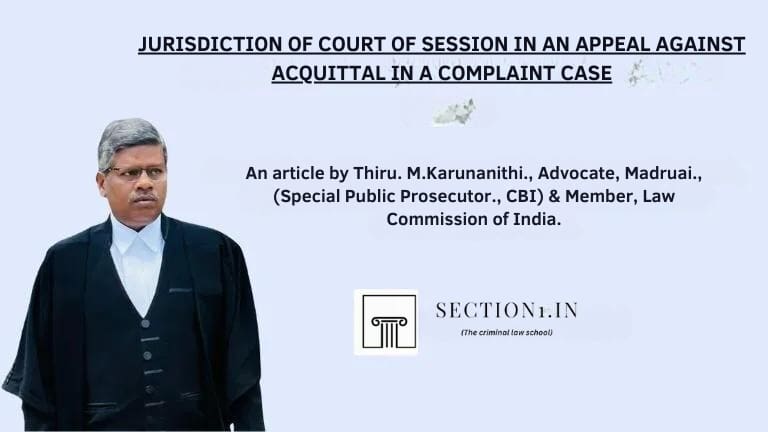DEFENCE COUNSELS DON’T WORRY I TEACH YOU TO TAKE DEFENCE
About Tamilnadu State Judicial Academy
Before I address the subject matter I incline to advance my appreciation towards the services of Tamilnadu State Judicial Academy rendering through online and offline to the lawyer’s fraternity all over Tamilnadu. There are many articles available in its website[1] and they are free to access. Not only Senior Advocates, Judicial Officers so also the Hon’ble Judges of the Apex court and High courts have bestowed their thoughts on this website by way of uploading their articles and speeches. Having gone through this website you may find archives such as age-old circulars and orders of the Hon’ble Madras High Court which is indeed useful documents for lawyers for their assistance.
My quote
My senior constantly advises me to read the section first, take as it is, understand as it is and if you still have doubts try other options.
However, I find a strange article uploaded in this platform showing the author’s anguish against the defence counsels (not some or many but everyone) which is named as “THE CROSS EXAMINATION AND ROLE OF COURTS – A REVIEW” (for the purpose of this article ‘author’ means the author of ‘the cross examination and role of courts – a review). This article is the best example to show how not to write an article that too against the defence counsels, since, I am one among them I am going to teach lessons on cross-examination and noting demeanour of witness to this author in the fond hope that he might learn this at least now.
Judicial Academy never expresses anguish in its uploaded articles against any particular sector of lawyer’s community. I feel so happy that the TNJA did not take responsibility for this article. Please note that for the purpose of this article I concern only criminal cases and demeanour of witnesses further I am countering the above article is to say that defence counsels cannot take any defence at the threshold but only at the stage of defence.
By reading his article it is clear that the author was under the fallacy that the cross-examination is only for the defence counsels which in the first place he has to learn that even Public Prosecutors may cross-examine witnesses. The author of that article tries to teach, how to take defence in sessions trial (criminal cases) to the defence lawyers and to note the demeanour of witness to the trial judges in both points he did not substantiate any sources except his wrong opinions.
I am concerning about the Sessions Trial cross-examination whereas of course, the author tried to illustrate some cases such as sections 376 and 489 of the Indian Penal Code which miserably goes to show that the author does not aware of the proposition that to appreciate the defence a judge must wait till the accused entering upon his defence under section 233 Cr.P.C and concludes it. What are defence counsels doing till then by cross-examine the witnesses and particularly in putting suggestions? Somebody has to tell this author that the accused was only trying to disprove the prosecution case by eliciting contradictions and putting questions which are relevant to the issue in the case and shaking the witness credit. In other clear words the defence lawyer is trying to give a version of the accused either he is going to disprove the prosecution case (one version) or he is going to take any particular defence at the defence stage (ex. If he puts suggestion by taking a stand of alibi, he is suggesting the witness that he is going to prove the alibi during the defence stage, hence the witness may now itself tell the truth).
A simple example
I may now go with this simple example: In a case a defence counsel is eliciting answer from the P.W-1 in the cross-examination as if the accused has done the crime at 8’O clock in the morning of Sunday 1.1.2018 and further did not suggest anything; does this mean he failed in his defence (crushing defence in author words)? Certainly not! As I said earlier the role of the trial judge here is to wait till the accused entering upon his defence and completes, and not overwhelmingly coming to the unprofessional conclusion that the defence counsel did not construct his defence. Now, the judge has to put the accused about the incriminate circumstance (only) under section 313 Cr.P.C as if “what do you say about the time and date found in the deposition of witness P.W.1 (not copy paste the chief-examination of P.W-1)”. Accused while entering upon his defence shall explain his defence (his side story) in his written statement, further successfully proves by providing oral and documentary (including CCTV camera, let us speak for this age) evidences that he was elsewhere at 8’O clock in the morning of Sunday 1.1.2018? Right! now, what is the veracity of the answer elicited from P.W-1 as if the accused was at the crime scene? Only an amateur will say that the defence counsel should have put the suggestion to that effect during the cross-examination of P.W-1. But an experienced trial judge will just compare the contradictions and gives the benefit to the accused. [Now what is contradiction? In a general parlance, Contradiction is inconsistency in the material particulars between the previous statement and the deposition of a witness or inconsistency in the material particulars between deposition of witnesses].
When would a defence counsel takes defence?
Besides, till the time of section 313 Cr.P.C (by filing written statement), it is to be noted that the accused did not construct any defence but just exposing the court that the prosecution witnesses are not reliable to convict the accused by putting contradictions and confrontations. The defence is making an attempt to prove that the prosecution witness may be a vicious liar. I may pile catena of decisions to that effect but fewer is enough for this proposition and one of them is Naval Kishore Singh vs. State of Bihar reported in 2004 (7) SCC 502 in which the Hon’ble Apex Court has held as follows and clears the proposition of entering defence:
“The trial judge should have kept in mind the importance of giving an opportunity to the accused to explain the adverse circumstances in the evidence and the Section 313 examination shall not be carried out as an empty formality. It is only after the entire evidence is unfurled the accused would be in a position to articulate his defence and to give explanation to the circumstances appearing in evidence against him”.
[also see: Reena Hazarika vs. State of Assam – Crl. Apl No: 1330 of 2018 – 31.10.2018 – 2018(13) SCR 1108 and Maheshwar Tigga vs. The State of Jharkhand – Criminal Appeal No. 635 of 2020 (Arising out of SLP (Crl.) No. 393 of 2020) – Decided On: 28.09.2020 [para. 9]
Whether Cross-examination is defence?
Speaking of cross-examination, the Apex Court has held in its unequivocal terms that it is the jurisprudence of law that cross-examination is an acid-test of the truthfulness of the statement made by a witness on oath in examination-in-chief, the objects of which are:
1. To destroy or weaken the evidentiary value of the witness of his adversary;
2. To elicit facts in favour of the cross-examining lawyer’s client from the mouth of the witness of the adversary party;
3. To show that the witness is unworthy of belief by impeaching the credit of the said witness; and the questions to be addressed in the course of cross-examination are to test his veracity; to discover who he is and what is his position in life; and to shake his credit by injuring his character[2].
It is apposite to note that the Hon’ble Supreme Court while issuing guidelines did not say that taking defence is the part of cross-examination.
The fancy of the author to teach the defence counsels to take their defence during the examination is being conveyed by giving two wrong illustrations in his article that too based on suggestions. First of all the author is confined with only one witness i.e. P.W-1 in section 376 IPC cases and P.Ws 1 and 3 in 489 IPC cases. I wonder how a trial judge could see the defence of the accused during cross-examination of the earliest witness who is the P.W-1? Probably the author might think the trial judges are omnipresent all the times.
The following paragraph of the author is only showing his inexperience in writing article, besides, he has quoted an incorrect statistic which may even leads to defamation:
“While the Judge is expected to be very active while recording the evidence, he/she has to face the sudden confrontation in respect of admissibility of the questions put to the witnesses. By and large it is expected that the Judge shall be a silent spectator thereby allowing all the unwarranted questions be put to the witness. More often the questions, which mutually crush the defence of the party concerned are put to the witnesses. In short, the real objective of eliciting the truth during cross examination is totally missed and the parties are on to a different track/version which they themselves would not expect. Hence an attempt is made through this article to analyze the importance of cross examination and the factors affecting the Justice Delivery System”.
The author perhaps confuses himself with the cross-examination and the justice delivery system, so, hereby I clarify him that a justice delivery system (in other words to deliver the justice) involves an appreciation of both chief and cross-examination of witnesses. The author further worried that by and large it is expected that the judge shall be a silent spectator thereby allowing all the unwarranted questions be put to the witness. I failed to understand wherefrom this author got this incorrect statistic and whereby he is totally responsible to provide strict proof to substantiate the same. In practice, what the defence counsels are expecting is the judge must know everything in law while sitting in the dias, so that they may conduct the trial in a diplomatic manner. We represent as ‘your honour knows’, and not ‘what do you know’. Speaking of crushing evidence as I said already that a judge should be a time traveller to know what is the defence of the accused. Further, at this moment, I must present this author what is active participation which is better in the words of the Hon’ble Supreme Court:
“With such wide powers, the Court must actively participate in the trial to elicit the truth and to protect the weak and the innocent. It must, of course, not assume the role of a prosecutor in putting questions. The functions of the counsel, particularly those of the Public Prosecutor, are not to be usurped by the judge, by descending into the arena, as it were. Any questions put by the judge must be so as not to frighten, coerce, confuse or intimidate the witnesses”[3].
I guess the author had wrongly understood the active participation theory. Active participation means putting questions to the witnesses under section 165 Evidence Act by actively participating in the trial and not to the defence counsels (I find no section) to make a perfect defence. Maybe, what the author trying to say through this article is that trial judges may actively participate and see to that to put any questions to the defence counsels (in his article he has used the words ‘warn the counsel’) but don’t bring that questions and answers in the record.
Wrong Illustrations
The author has given his opinion as per whims and fancies under a specific paragraph “d. NON DEVIATION FROM THE SCOPE OF DEFENCE” and has provided two wrong illustrations which cannot be taken in isolation during appreciation.
Let us take his first illustration (CASE No. I (Cross of PW1, Victim in the offense u/s 376 IPC before Mahila Court). In this, the author relied the following portions of cross-examination (for the purpose of this article I just split up) in his wrong opinion as crushing defence:
1. Victim never had any acquaintances with the accused.
2. Victim’s maternal uncle had land dispute with the accused.
Now author takes a break and stated as if while nearing the end of cross examination, it’s very unfortunate that an incriminating question crushing the above defence if put to the witness and continued,
3. Victim was in the habit of bicycling and hence by virtue of your cycling habit, the doctor has wrongly concluded that you are exposed.
After being devoted his opinion on us the author has stated as follows:
“When this being the circumstance, the Trial Judge can very well warn the Counsel and make him restrict to his defence”.
I wonder under which law a judge may warn a counsel and to restrict his defence. I failed to realise what in his opinion is crushing the defence in the above example of his case-1? Again the author did not present the entire case but a superficial glance of suggestions (it is a basic evidentiary jurisprudence that suggestions are not certainly evidence unless it is an impeachment), so we do not know in the given case (case-1) whether the defence counsel could have substantiated his suggestions or not. What if in the given case defence counsel could have very well substantiated by submitting case details of a previous vendetta between the victim’s maternal uncle and the accused? What if the defence counsel could have submitted a video/photograph showing that the victim can ride a bicycle? If we take in the sense of illustration and the opinion of the author, there shall not be in need of a clause to entering upon defence to substantiate his case under section 233 Cr.P.C and may straightaway convict the accused by having a wrong opinion like this author. If at all the author might thought those are incriminating questions against the accused why shall not, he wait till the stage of questioning without developing overwhelming emotions to warn a counsel who cross-examine the witness. Who taught the author like this? I am eager to know.
[A latest Division Bench of the Hon’ble Madras High Court has held that Trial Court cannot insist upon the defence counsel to put a particular question in a particular manner and to take a particular defence. This is within the realm of the accused and his counsel. The court cannot either advise, interfere or act in aid of defence counsel – A.Sebastian vs. Inspector of Police, Kumapatti Police Station – Criminal Appeal No:262 of 2020; Crl.M.P No: 4046 of 2020; dt:04.03.2021; and Chandrasekhar Patel vs. Suresh & ors – Crl. Apl. No: 1163 of 2018 – 2023 INSC 1083 – NOVEMBER 30, 2023 Of course, I am fully aware that these Judgments were not delivered when the author wrote his article. Nonetheless, the aforesaid Hon’ble Madras High Court Division Bench and Apex Court judgments to to show that the author had his own wrong and egoistic goal while educating judges who are conducting trials].
In the above case if the author should have wait till taking defence the matter would have been different. If the defence counsel would not substantiate his defence then the trial judge in his judgment may very well find regarding that till then it is fallacious to have such a wrong notion.
Let us take case -2: What the author illustrated has no connection with section 489 IPC at all and the same shall not be tried by the Sessions court inasmuch as the imprisonment for that offence shall be which may extend to one year or fine or both. Section 489 IPC speaks about tampering with property mark with intent to cause injury, whereas what the author proposed to say shall be under sections 489A to 489-E IPC. Since the very inception itself was illegal and indicates the ignorance of the author I don’t want to go into this and explain inch by inch, inasmuch as this author giving wrong details. I advise this author in future before publishing anything he must develop the tendency of reading the draft at-least twice.
Contradiction of hostile witness
Besides, this author concern about the mechanical recording of evidence by the Public Prosecutors in their cross by simply reciprocating the statement u/s 161(3) Cr.P.C. would be improper. Then why do record as such? Why not the author conveniently forgets to inform the trial judges to very well warn such Public Prosecutors? By reading these lines this author is craving to advise the readers without having correct particulars or by giving wrong illustrations and opinions which is no doubt fully demolish the well-settled legal principles. Right, coming to the current scenario, there is nothing wrong in reciprocating (I guess the author means reproducing) the statement recorded under section 161(3) Cr.P.C, again, if this author waits until the same public prosecutor confronts the same with the Investigation Officer then the author could have learned something. If an experienced Public Prosecutor in this situation could have put leading questions to the witness and confront the same with I.O to prove that witness chief-examination was not reliable inasmuch as, there is a danger of judge might appreciate some portions in favour of the defence [see: Bala & Others vs. State – 2014-1-LW (Crl) 213 (DB) and Krishan Chander vs. State of Delhi – (2016)1 SCC (Cri) 725=(2016)3 SCC 108=AIR 2016 SC 298 also see Whether the public prosecutor can contradict his own witness (partly)].
Noting demeanour of witnesses
Again, author expressing his views by advising dos and don’ts on noting demeanour of witnesses by citing a judgment of the Hon’ble Madras High Court R.Palanisamy vs State By Inspector Of Police [2013-2-LW(Crl) 169 (Mad-DB)= 2013(2) MLJ (Crl) 812 (Mad-DB)]. Though the above said judgment has been cited in many journals I do not know why the author has classified that as unreported one. Authors who are determined to write articles should have a habit of reading all journals for cross-references before publishing it and should not publish as it is or on his “whims and fancies”.
Now what is noting the demeanour of the witness has been explained in simple words of the Hon’ble Apex court in as follows:
“the reason why this Court held that the proceedings by a successor Judge cannot be started from the stage left out by his predecessor was that a Judge who had heard the whole of the evidence before had the advantage of watching the demeanour of the witnesses which would be lost if the successor Judge was to proceed from the stage left by his predecessor”[4].
The above paragraph explains the core of noting demeanour of witnesses. I am shocked to see that the author has inscribed in his article as such the trial judges are not bound to note the demeanour of witnesses. Yes, ‘bound’ is the phrase he used which shows that the author misread and misunderstood the section and the concept of noting demeanour. Noting demeanour is only the procedure as such it is contemplated under Criminal Procedure Code and not under Evidence Act. While respecting the demeanour the trial judge has no other option but bound to note the same ‘if any’. If the author could have read section 280 Cr.P.C in the correct context by reading the words ‘when’ and ‘shall’ he might have possibly understood that the trial judges have no other option but bound to note the demeanour ‘if any’. I see strange that the author does not have a habit of reading latest judgments from madras High court itself. He travelled long back to quote Kishan Lal Gupta vs Dujodwala Industries And Ors. on 19 February, 1976 in his view as a classic example for noting demeanour, but refused to read the judgment of the Hon’ble Madras High Court R.Srinath vs The State[5] in noting the importance of noting demeanour of the witness. In this case now His Lordship Mr. Justice P.N.P.J then the lawyer contested the case on behalf of the petitioner has explained the example of noting demeanour which I failed to see why not be seen by the author.
Admissible portions of confession statement
Finally, the author has stated in his article as follows:
“At the most, the admissible portions of confession statement could be marked after the admission of the witnesses to the confession theory”.
I as a practicing lawyer, even tried to reason the above lines in several angles under the settled propositions of law, I do not understand what the author wanted to convey exactly to the readers. “Admission of the witnesses to the confession theory” might be the innovative discovery of the author, but, it is rudimentary and also an elementary even a law college final year student would explain that a witness before the court cannot admit about a confession (in author’s words) of another person’s crime inasmuch as admission is a fact admitting by a witness, but confession shall not even be a ‘fact’ which has no evidentiary value and hence the witness cannot confess another person’s crime. The author failed to see that there is no section under the Evidence Act which empowers the judicial officer to take confession on record given by the accused. Section 164 Cr.P.C or other Acts (e.g., 5(2) P.C Act) is explaining the powers of courts to record confession before charge sheet filed or during investigation and not any later. So, author must learn that there is no such thing as admission of the witnesses to the confession theory before a court that too in a witness stand.
I hope after reading this article, the author may read the law as it is and understand as it is without having any wrong opinions while reading the law. Even if he fails to do so be ready to learn because, there are many defence counsels available to teach him lessons.
[1] http://tnsja.tn.nic.in/articlenew.html.
[2] Jayendra Vishnu Thakur vs. State of Maharashtra & Another – 2009(3) MLJ (Crl) 1024(SC)=2009(7) SCC 104
[3] Ram Chander vs. State of Haryana – AIR 1981 SC 1036
[4] Nirpal Singh And Others Vs State Of Haryana – (1977) 2 Scc 131=(1977) Scc(Cri) 262.
[5] Crl.O.P.No.25787 of 2010 – 11.03.2011 [Ordinarily we may place reliance on other High court judgments only when Madras High Courts did not deal with that point and the other High Court has dealt with that].
[2] Jayendra Vishnu Thakur vs. State of Maharashtra & Another – 2009(3) MLJ (Crl) 1024(SC)=2009(7) SCC 104
[3] Ram Chander vs. State of Haryana – AIR 1981 SC 1036
[4] Nirpal Singh And Others Vs State Of Haryana – (1977) 2 Scc 131=(1977) Scc(Cri) 262.
[5] Crl.O.P.No.25787 of 2010 – 11.03.2011 [Ordinarily we may place reliance on other High court judgments only when Madras High Courts did not deal with that point and the other High Court has dealt with that].






